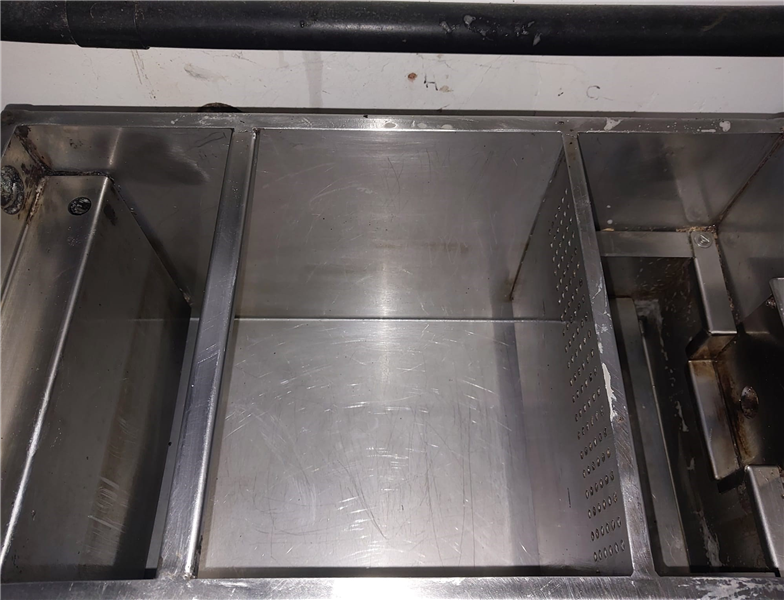
Grease is a tricky little contaminant that, if not managed correctly, can cause significant issues for businesses and the environment. Any business, or venue, that produces hot food will ultimately have fats, oils and grease (FOGs) entering their drainage systems, with higher volumes of cooking leading to higher volumes of the solid or semi-solid pesky grease. That means your sports stadiums, superyachts and hostels, among other large conglomerates, need an effective device to manage extortionate amounts of grease! But what can possibly manage all those FOGs?
Aqua Mundus is here to help explain how you can stay safe from the harmful effects of grease, keeping your customers, the environment and your business healthy and legally compliant.
Grease Traps to the Rescue!
Grease traps are the number one saviour to tackle managing grease in all kinds of environments. These simple yet effective devices serve as the first line of defence against the infiltration of FOGs into drainage systems.
How Does a Grease Trap Work?
Grease traps, sometimes referred to as grease interceptors, are designed to do exactly that, intercept and trap grease before it enters wastewater and sewer systems. They are made up of several parts which serve different functions.
- Inlet: Wastewater containing grease enters the grease trap through an inlet pipe.
- Settling: With the wastewater inside the trap, it will slow down, with the grease and oil solidifying when cooling, allowing for natural separation from the water.
- Retention: The trapped grease will accumulate in a separate compartment within the trap, while the now clean water will flow through the system into the sewage system.
- Discarding of the grease: The grease will collect in a separate compartment and will need to be emptied frequently adhering to health and safety regulations.
Cleaning and maintaining a grease trap is essential for it to function properly, and we have a handy guide that explains everything you need to know.
Which Grease Trap Will Work Best?
Now that you know what a grease trap is and how it works, what type of grease trap will work best for these massive enterprises and locations?
Above Ground Grease Traps
The first type of grease trap common among many commercial food businesses, and is probably found on the likes of Jeff Bezos’ superyachts, is above-ground grease traps. This type of grease trap comes in two main varieties – passive and automatic. Essentially, the main difference between these two types is the build-up of FOGs inside the units and how they are discharged. A passive manual grease trap will collect the grease in the bottom of the unit or a strainer, typically located at the side of the trap. Users will have to manually remove the accumulated grease, whereas an automatic trap has a mechanism that automatically removes the grease to a completely separate container.
Above-ground grease traps are typically smaller than below-ground ones, and will most likely be located near sink areas, meaning they are ideal for establishments with multiple sinks set up – like a superyacht or sports stadium.
For more information on above-ground grease traps, explore our guide here.
Below Ground Grease Traps
Below-ground grease traps will be buried underground and are ideal for large amounts of FOGs produced in the likes of sports stadiums. As a sports stadium can serve tens of thousands of people, the need for a huge grease trap is an understatement. A venue like this will often employ several below-ground grease traps, as well as above-ground traps to facilitate the amount of food and grease produced. A hostel would also adopt a below-ground grease trap as they are more aesthetically pleasing as they will be hidden from view. For more information on below-ground grease traps, read our full guide.
Where Does the Grease Go on a Superyacht?
Maritime laws are strict, and the likes of Bezos, Musk and Gates can’t just tip their accumulated grease overboard when far out to sea in their ginormous, extravagant and fully kitted-out billionaire boats. No matter the type of grease trap, emptying the grease and discarding it must be done at some point, so where does all this grease go when out on the seven seas?
Superyachts will have a sophisticated system using membrane technology to treat wastewater, and without effective grease management, serious problems will occur. The lovely job of removing the accumulated grease will be carried out and stored in separate containers before arriving at a port.
Grease Traps for All From Aqua Mundus
Here at Aqua Mundus, we are a UK-leading grease trap supplier with a wide range of traps for businesses of all kinds, including sports stadiums, hostels and yes, even superyachts! We provide extensive grease management services, including free site surveys to assess what grease trap will work best for your location, installation as well as maintenance and servicing. From small kitchens to hostels and environments the super-rich inhabit, Aqua Mundus is here to help manage your grease. Call us on 01386 832205 or send your enquiry to emailus@awuamundus.co.uk.